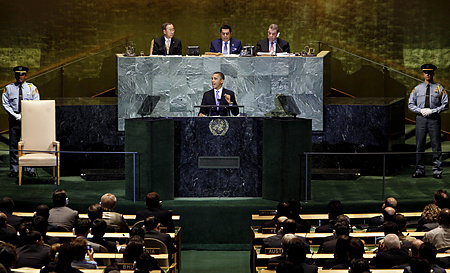
President Barack Obama addresses the 66th session of the United Nations General Assembly, September 21, 2011. (Photo: Richard Drew / AP)
In a U.N. General Assembly address to which the world looked for a meaningful response on the stalled Israeli-Palestinian peace process, President Barack Obama delivered a pretty good domestic reelection campaign speech. Pro-Israel voters and donors in the U.S. will have been reassured by the President’s passionate assertion of Israel’s security needs, based on the real and bitter history of Jewish suffering, which he warned that the Palestinians and their friends ignore at their peril. And they will have appreciated Obama’s echoing Israel’s mantras about bilateral negotiations being the only route to peace.
But for the Palestinians and much of the wider international community, the things Obama left unsaid that will have reinforced a growing sense that U.S. domestic politics restrains Washington from playing the honest broker role it has claimed as its exclusive preserve since the Oslo agreements 18 years ago.
It was telling that Israel’s far-right foreign minister Avigdor Lieberman said afterwards, “I congratulate President Obama. I am ready to sign on this speech with both hands,” hailing the Obama’s omission of issues such as settlements and the 1967 borders. Lieberman, of course, fiercely rejects the international consensus on parameters for a two-state solution. If Lieberman was happy with the speech, it’s a safe bet that most of the Arab public was not.
Wednesday’s U.N. address was a sharp contrast to the Cairo speech Obama made in 2009, where he had discussed both Israel’s legitimate security fears and its creation as a response to a history of Jewish suffering as well as the dispossession of the Palestinians and the humiliation of living under Israeli occupation.
“The Jewish people have forged a successful state in their historic homeland,” Obama said Wednesday. “Israel deserves recognition. It deserves normal relations with its neighbors. And friends of the Palestinians do them no favors by ignoring this truth, just as friends of Israel must recognize the need to pursue a two state solution with a secure Israel next to an independent Palestine.”
The Cairo speech had noted that Israel’s creation had displaced the Palestinians, and that peace required redress for their six decades of suffering. But in his U.N. address, Obama spoke only of Jewish suffering and Israeli security concerns, with not a word about the occupation, or about the settlements whose continuing expansion even Obama himself had tried and failed to stop. And the Arab countries have long made clear, in the 2002 Arab Peace Plan often cited by the U.S., that the price of normalization is Israel’s agreement to a solution based on the 1967 borders.
Adopting a tone of scolding exasperation, Obama said that while the U.S. believes the Palestinians deserve a state of their own, that can’t be achieved through U.N. action or imposed from outside.
“I know that many are frustrated by the lack of progress. So am I. But the question isn’t the goal we seek – the question is how to reach it,” Obama said. “Ultimately, it is Israelis and Palestinians – not us – who must reach agreement on the issues that divide them: on borders and security; on refugees and Jerusalem.”
But the reason the issue is on the U.N.’s agenda at all, he seemed to tacitly acknowledge, is that “the two sides have not bridged their differences” on those key issues.
“Faced with this stalemate, I put forward a new basis for negotiations in May,” Obama said. “That basis is clear, and well known to all of us here. Israelis must know that any agreement provides assurances for their security. Palestinians deserve to know the territorial basis of their state.”
Of course, when Obama in May had said that the territorial basis of a two-state solution would be the 1967 borders with mutually agreed land swaps, he was sharply rebuked by Prime Minister Netanyahu. While the Israeli leader talks of a two-state solution, he has yet to embrace some of the key parameters of such a solution as defined by the international consensus — 1967 borders, a Palestinian capital in East Jerusalem, a mutually agreed solution to the refugee issue. Obama essentially evaded the question of why negotiations had failed, and where the positions of each party differed from the global consensus on terms for a two-state solution.
The speaker of who followed Obama, Qatar’s Sheikh Hamad bin Khalifa Al-Thani — the key Arab ally in the regime-change campaign in Libya hailed by Obama as the model for the future — has no such qualms. Expressing a view shared by much of the international community on the reason for the stalemate, he said talks had failed because of Israeli “intransigence”, and that it was up to the U.N. to break the deadlock.
Perhaps aware that his message on Israel and the Palestinians — no matter how popular at home — was not going to win him many fans in the Arab world (where his approval rating is currently around 10%), Obama seemed more comfortable hailing the Arab spring and U.S. support for rebellions in Libya and Syria. The problem there, of course, is that focusing on the Arab Spring simply highlights what many will see as a double standard: Hailing the courage of ordinary men and women in Egypt, Syria and Libya standing up to demand universal human rights invites the question of the rights of Palestinians or Bahrainis to do the same.
Obama, in fact, seemed all too aware of the metric by which his — and America’s — credibility in the Middle East will be judged. “I know that for many in this hall, one issue stands as a test for these principles – and for American foreign policy: the conflict between the Israelis and Palestinians.” And his speech is unlikely to have convinced many in that audience to give him a passing grade.

